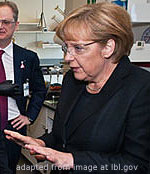Merkel’s Re-Election Called Good for Russia

(Moscow Times – themoscowtimes.com – Yekaterina Kravtsova – September 24, 2013) The victory of German Chancellor Angela Merkel’s conservative party in the country’s general elections Sunday is expected to secure the stability of Russian-German relations for the next four years, despite German’s recent criticism of human rights in Russia.
Taking 41.5 percent of the vote, Merkel’s conservative bloc consisting of Christian Democratic Union (CDU) and the Bavarian Christian Social Union (CSU) showed the best result since the German unification in 1990 and came close to an absolute majority in the parliament.
But Merkel, who is now settling in for a historic third term, will have to create a coalition government. Most observers say she will revive a coalition with the Social Democrats (SPD), who took second place with 26 percent of the votes.
Such a coalition would be beneficial for relations with Russia, analysts say.
“A coalition between the CDU/CSU and the Social Democrats would probably soften the tone toward the Russian government again. The CDU/CSU is split over the issues, while the SPD is traditionally in favor of the ‘Schröder’ approach,” said Jens Siegert, who heads the Moscow office of the Boell Foundation, a Green Party-leaning think tank.
Merkel, who is seen as the closest ally of President Vladimir Putin in the European Union, has never had as friendly relations with him as her predecessor Gerhard Schröder had.
In her party’s election program, Merkel praised bilateral relations with Russia as “neighborly” and called for a new partnership agreement between Russia and the EU, more intensive cooperation between citizens of the two countries and further steps toward a visa-free regime for entrepreneurs, students and academics.
But how deep these relations will be depends on whether Russia is ready to fulfill its obligations in guaranteeing legal and democratic standards for its citizens, the program said, apparently referring to a number of controversial laws approved recently by the Russian government, including one that affected the work of foreign NGOs in Russia and saw several German NGOs hit by unscheduled inspections in the spring.
“The political rollback in Russia last year and this spring changed Germany’s public mood. The harassment of LGBT people and the imprisonment of the punk band Pussy Riot was widely perceived in Germany as . And Angela Merkel is quite sensitive to public opinion,” Siegert said.
Despite the friction in Russian-German relations due to human rights issues in 2013, however, the two countries have survived such periods in the past, when relations were marked by mutual tensions and unusual measures were used to influence the other country’s position on a given issue.
In 2007, when Merkel visited Sochi, Putin allowed his Labrador retriever to approach her, despite knowing that she was afraid of dogs, and the incident led to a more friendly tone between the two countries, Germany’s Die Zeit reported at the time. Putin is believed to have used the dog intentionally to express displeasure over Merkel meeting with Russian dissidents and taking a tough stance on the murder of Putin critic and journalist Anna Politkovskaya, the report said.
Even if Merkel continues to be outspoken about Russian issues in the future, analysts say it probably will not have much of an impact on bilateral affairs.
“Merkel will probably continue to criticize Putin on human rights, but that will not lead to any dramatic decline in relations,” said Vladislav Belov, head of the German Studies Center within the Moscow State International Relations Institute, adding that the two countries were bound by not only economic cooperation, but also strong ties in political, educational and scientific spheres.
Jens Böhlmann, a spokesperson for the Russian-German Chamber of Commerce, said Merkel’s victory guaranteed stability in Russian-German economic relations while at the same time paving the way to further development. Despite some contradictions, he said, cooperation on the level of business has been successful.
“The Russian market is huge and there are many spheres that could be developed further, especially with large international events set to be held in Russia, like the FIFA World Cup in 2018 and Formula 1 Race in Sochi in 2014. German companies can provide high-tech solutions for these projects, and that is what Russia needs,” Böhlmann said.
He also said the only barrier for cooperation between the two countries was German commitments in the European Union, since certain economic decisions had to be made by the joint European body.
Siegert seemed to disagree, however, noting that there were growing complaints from German businesses, especially mid-sized and small companies, about worsening conditions for doing business in Russia. Many of those complaints cited increasing corruption, he said.
Observers believe that the failure of Merkel’s allies, the liberal Free Democrats, to secure representation in the government will force her to team up with the Social Democrats, with whom she had a coalition from 2005 to 2009 after being elected chancellor for the first time.
The Free Democrats got only 4.8 percent of the votes and dropped out of the Bundestag for the first time in 50 years.
“I expect that Merkel will decide to lead a ‘grand-coalition’ again with the Social Democrats, and former Foreign Minister Frank-Walter Steinmeier will most likely become foreign minister again,” said Julius von Freytag-Loringhoven, head of the Moscow office of the FDP-leaning Friedrich Naumann Foundation.
“Steinmeier has a very good relationship with the Kremlin that goes back to Schröder times,” he said.
[featured image is file photo]
